|
|
|
Sort Order |
|
|
|
Items / Page
|
|
|
|
|
|
|
| Srl | Item |
| 1 |
ID:
120304
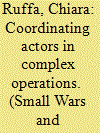

|
|
|
|
|
| Publication |
2013.
|
| Summary/Abstract |
International responses to conflicts and humanitarian emergencies have become more crowded. Not only do traditional actors intervene on a greater scale, such as non-governmental organizations and the military, but new actors such as Private Military Security Companies also play an increasingly important role. These actors often differ in their precise objective and the constituencies they are accountable to. Yet, the practices of these actors in operations are intertwined and many of their tasks overlap. Improved communication and coordination of these actors in complex operations can thus be expected to lead to strong increases in mission effectiveness. This Special Issue provides a conceptual platform to understand and explain under what conditions coordination among these actors occurs. The articles cluster around three themes. A first set focuses on who the actors involved are along a private vs public and military vs civilian divide; a second group of articles assesses experiences of coordination of different actors in the field; finally, a third looks at a plurality of elements that may trigger or hinder coordination.
|
|
|
|
|
|
|
|
|
|
|
|
|
|
|
|
| 2 |
ID:
134008
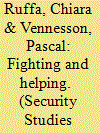

|
|
|
|
|
| Publication |
2014.
|
| Summary/Abstract |
In complex humanitarian emergencies, why are NGO-military relations cooperative in some cases, yet deeply conflictual in others? Drawing on historical-institutionalist theoretical insights, we argue that NGOs and military organizations are embedded in, and responding to, domestic institutional configurations that define a set of political incentives and constraints, material and normative, which structures and influences the characteristics and outcomes of their relations. Counterarguments suggest that organizational differences and the nature of their missions affect NGO-military relations. Using fresh empirical evidence we assess these arguments by comparing the Italian and the French experiences of NGO-military relations during the NATO-led International Security Assistance Force (ISAF) mission in Afghanistan and the UN mission in Lebanon (UNIFIL II) between 2007 and 2011.We find that domestic institutional configurations are not left behind when NGOs and military units deploy abroad. Rather, they shape NGOs' and militaries' capacity to work together instead of at cross purposes and ultimately influence the success of international action.
|
|
|
|
|
|
|
|
|
|
|
|
|
|
|
|
| 3 |
ID:
183894


|
|
|
|
|
| Summary/Abstract |
Academic research on civil-military relations often assumes that dangers for democracy and civilian control mainly emanate from the military's predisposition of ‘pushing’ its way into politics. Yet, civilian control frequently is a precondition for governments’ moves of ‘pulling’ the military into roles that may potentially be problematic. These can include the military's involvement in political disputes or internal public security missions. Notwithstanding its empirical relevance, little academic work has been devoted to understanding how ‘pulling’ works. In this article, we aim to provide a first, exploratory framework of ‘pulling’ that captures the dynamics of the military's reactions and indirect consequences for civil-military relations. We identify three analytically distinct phases in which pulling occurs. First, politicians initiate either operational or political pulling moves. Second, we situate the military's reaction on a spectrum that ranges from refusal to non-conditional compliance. This reaction is driven by the military's role conceptions about appropriate missions and their relation to politics. In a third phase, the military may slowly start shifting its role conceptions to adapt to its new roles. We illustrate our argument with case studies of two different instances of pulling: operational pulling in the case of France (2015–19) and operational – then-turned-political – pulling in the case of Brazil (2010–20).
|
|
|
|
|
|
|
|
|
|
|
|
|
|
|
|
| 4 |
ID:
121154
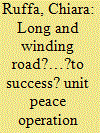

|
|
|
|
|
| Publication |
2013.
|
| Summary/Abstract |
Why does peacekeeping sometimes fail? How can effective peacekeepers increase the likelihood of success of a mission? The two main flaws in the current evaluations of peace operations are that they mainly rely on already concluded missions and that they make use of indicators that do not reveal micro-level dynamics. This article introduces an analytical framework relating the effectiveness of soldiers to their actual impact in their area of operation in a peace operation. The framework is called "unit peace operation effectiveness" (UPOE). Focusing on soldiers in peace operations, this article shows that: different units behave differently; emphasize different aspects of the mandate; and are effective in different ways. Ultimately, this has an actual impact on the end-state of the mission. It relies on and adapts classic security studies works to theoretically enrich the peacekeeping literature. The model is tested in an illustrative case study based on ethnographic work on French and Italian units in Afghanistan between 2008 and 2010.
|
|
|
|
|
|
|
|
|
|
|
|
|
|
|
|
| 5 |
ID:
153175


|
|
|
|
|
| Summary/Abstract |
Although hundreds of thousands of soldiers from different national contingents are deployed every year in multinational peace operations, no previous study has examined differences in peacekeeping practices along national lines. This paper first documents systematically differences in the way national contingents behave during peace operations in their respective area of operation. In a second step, it argues that these differences in behavior are largely consistent with the most important traits of each army's military culture. Based on extensive fieldwork conducted between 2007 and 2014 in Lebanon and Afghanistan, the paper shows how, within each mission, Italian soldiers prioritized humanitarian activities, while the French engaged in more patrolling activities, despite being both contingents deployed under similar conditions. These variations in behavior are consistent with the way French and Italian soldiers perceive the mission and context in which they deployed. And both the differences in behavior and perception are in line with the respective armies' military cultures. This paper contributes to the debate on the role of ideational factors in international politics and in particular to the ongoing discussion on strategic and military cultures.
|
|
|
|
|
|
|
|
|
|
|
|
|
|
|
|
| 6 |
ID:
183890
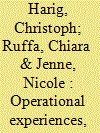

|
|
|
|
|
| Summary/Abstract |
A considerable amount of research within security studies has explored the military's increasingly diverse and multifaceted tasks. However, this debate has been disconnected from the literature on civil-military relations to the effect that we still lack knowledge about how and why these operational tasks have consequences for the relations between the armed forces, civilian authorities, and society at large. In order to provide for a better understanding of these effects, this introduction to the Special Issue debates the concept of operational experiences to capture how the military's routine activities affect the equilibria, logics, and mechanisms of civil-military relations. The article then provides an overview of the Special Issue's six contributions, whose diverse and global perspectives shed light on different aspects of the relationship between military missions and the military's roles in society and politics. Among other factors, they highlight role conceptions – the military's shared views on the purpose of the institution – as crucial in shaping the dynamic relation between what the military does and what place it occupies within the state and society. The article concludes by describing potentially fruitful areas of future research.
|
|
|
|
|
|
|
|
|
|
|
|
|
|
|
|
| 7 |
ID:
120312
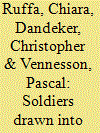

|
|
|
|
|
| Publication |
2013.
|
| Summary/Abstract |
The tactical level has become increasingly important in the conduct of contemporary complex military operations. Yet, the potential impact that this tactical level may have on domestic civil-military relations has been neglected. In this article, we focus on mechanisms by which low-level soldiers have acquired an increasing importance in tactical operations and we suggest that this may influence civil-military relations in the future. We argue that two phenomena deserve particular attention. These mechanisms are not new but they have had new effects by making it possible for soldiers to influence politics in sometimes unforeseen ways: the first is the strategic corporal and the second is the expansion of ancillary tasks. Our contribution lies at the interface between military sociology and security studies and seeks to show how the tactical level of warfare has become a fundamental context in which civil-military relations are enacted. Exploring these dynamics is fundamental to understanding under what conditions soldiers may interact with other actors in complex operations.
|
|
|
|
|
|
|
|
|
|
|
|
|
|
|
|
| 8 |
ID:
166781
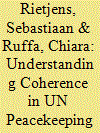

|
|
|
|
|
| Summary/Abstract |
Coherence is a core objective in most multinational interventions and seems of particular relevance to UN peacekeeping missions with their increasing complexity and multidimensionality. Yet, coherence has rarely been studied empirically. We borrow the concept of ‘fit’ from organizational theory and use it to develop a conceptual framework to study coherence in peacekeeping operations. Fit is the degree of match between what is required by the mandate, on the one hand, and an institutional set-up and the implemented practices, on the other. We identify three relevant dimensions of fit to study coherence: strategic and organizational, cultural and human and operational fit. Our empirical material focuses on the UN mission in Mali (MINUSMA) and in particular on the interplay between the intelligence components and the rest of the mission. We draw upon a large empirical dataset containing over 120 semi-structured interviews, field observations and participation in pre-deployment exercises and evaluation sessions. Our empirical analysis suggests that low level of fit across several dimensions leads to inertial and widespread frictions in the practice of peacekeeping and could potentially undermine peacekeeping effectiveness. Building on existing scholarship on micro-level approaches to peacekeeping, we hope to further the debate on organizational dynamics within peace operations.
|
|
|
|
|
|
|
|
|
|
|
|
|
|
|
|
| 9 |
ID:
137617
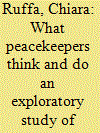

|
|
|
|
|
| Summary/Abstract |
This exploratory article points out how armies differ in the performance of their daily military activities during a peacekeeping mission and analyses the role of contrasting perceptions of the mission operational environment in explaining this variation. As a first step, this article documents systematic variations in the way French, Ghanaian, Italian, and Korean units implement the mandate of the UN mission in Lebanon in their daily military activity. Second, it shows that the four armies also interpret or “construct” the operational environment differently and in a way that is consistent with their different military behavior. Third, preliminary evidence suggests that previous experiences of each army influence the way in which the operational environment is constructed. Data were collected combining participant observation in Southern Lebanon with questionnaires and interviews. This article thus builds on sociological works on different operational styles but takes a methodological approach closer to that in security studies.
|
|
|
|
|
|
|
|
|
|
|
|
|
|
|
|
|
|
|
|
|